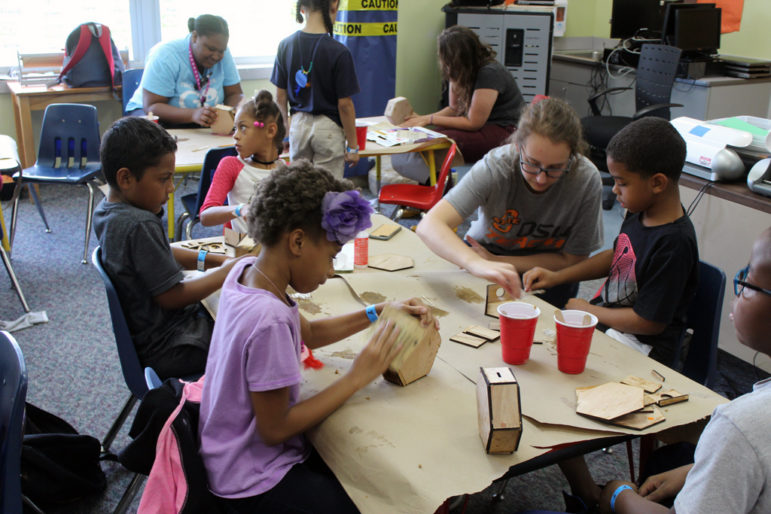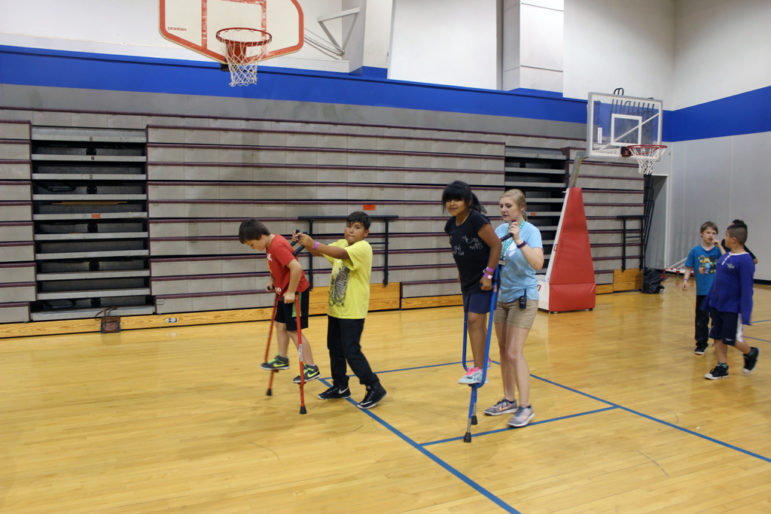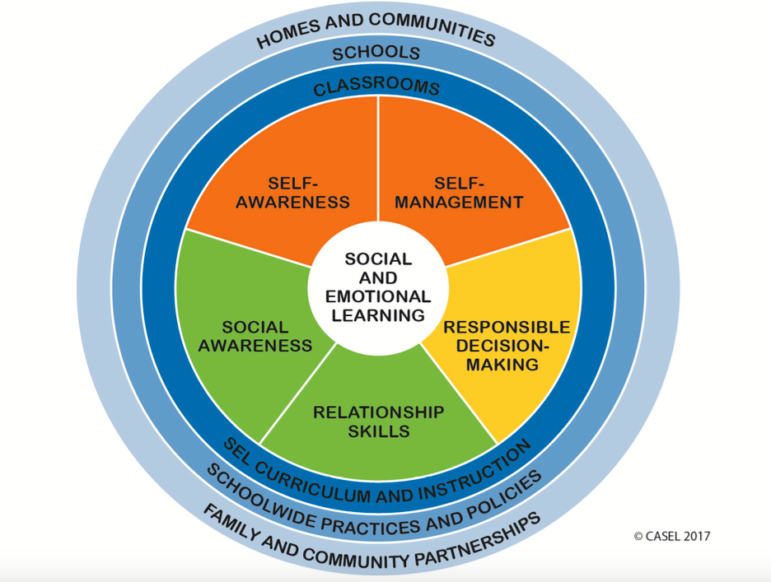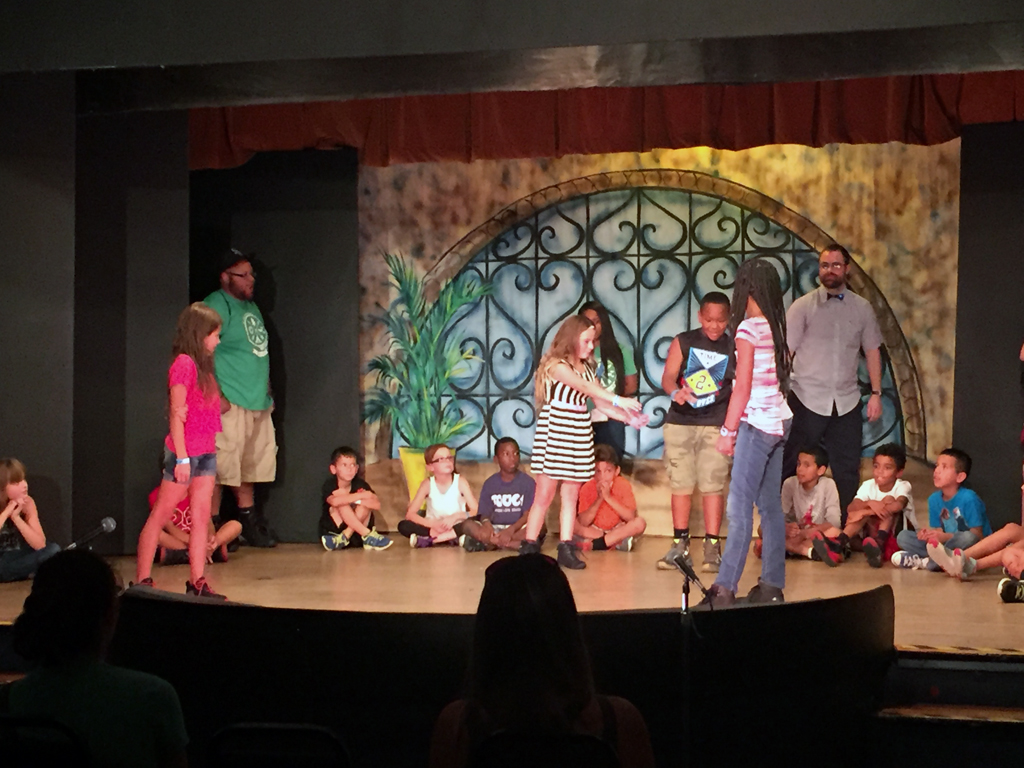When school starts this fall in Tulsa, Oklahoma, teachers and after-school staff will be working together in a new way.
In five elementary schools, they’ll be collaborating to create new instruction and a climate that helps students develop socially and emotionally.
Tulsa is one of six cities that has a four-year grant from The Wallace Foundation to foster social and emotional learning in a collaboration between the school district and out-of-school time organizations. The program is called the Partnerships for Social and Emotional Learning Initiative.
“We’re looking a lot at alignment,” exploring how after-school programs connect with principals, teachers and the school staff, said Caitlin Turner, senior director of educational initiatives for the YMCA of Greater Tulsa.
School staff have not traditionally worked with the out-of-school staff in this area, she said. “So often, there’s been a huge divide after the school bell.” The project is a huge opportunity for learning on both sides, she said.
Schools taking part in the Wallace initiative all have a high concentration of kids in poverty, said Gigi Antoni, director of learning and enrichment at The Wallace Foundation. It’s important to help these students be successful, she said.
“[The initiative] is a way to focus on that and on how to do it well,” she said. It also holds adults and school districts accountable for making sure all kids, regardless of where they live or grow up, get what they need, she said.
Social and emotional education is best implemented with three strategies, she said:
- Create a supportive climate and culture.
- Provide explicit instruction.
- Integrate instruction into other lessons or activities.
The six cities taking part in the effort will begin by getting teachers ready to implement explicit social and emotional instruction, Antoni said. In the first year of the grant, school districts and after-school organizations will be thinking about climate and culture and doing professional development, she said. They’ll be choosing curricula that fit with the district’s standards and they’ll be figuring out how to measure the program.

Children take part in a STEM lesson at a YMCA of Greater Tulsa after-school program. Tulsa is one of six cities in which the schools are partnering with an out-of-school time organization to align social and emotional learning, with funding from The Wallace Foundation.
“Cities are setting the stage and getting everything in place and ready,” Antoni said. “The kids will get explicit instruction in 2018.”
Creating the climate
In Tulsa, principals of the five schools have been trained in a method of creating a supportive school climate and teaching emotional intelligence. Known as RULER, this method includes creating a schoolwide collaborative document detailing how everyone wants to feel and treat each other, according to the Yale Center for Emotional Intelligence, which manages RULER. The tools include a “mood meter” that helps adults and students identify and talk about emotions. A conflict resolution process for use by staff and students is also taught.
Turner said that among three ways to help kids develop socially and emotionally — through direct instruction, creation of the right climate and culture, and integration of instruction into all other activities — the most important is to create a safe climate.
Adults must know how to create that environment, she said.
“We want to get our adults ready,” Turner said. It’s important to have adults trained to talk about relationships, responsible decision-making and sharing emotions in a healthy way, she said.
The Y operates after-school programs at two of the five schools in the pilot program, Eugene Field Elementary in west Tulsa and McClure Elementary in the south of the city, described in the Tulsa World as one of the city’s toughest inner-city schools.
YMCA programs have long been focused on the “whole child,” Turner said. The Y began offering an after-school program at McClure as a result of high childhood obesity rates, she said.

Social and emotional learning is woven into the activities of many out-of-school time programs. Here, kids do circus arts in a Tulsa YMCA after-school program.
The program offers 30 to 60 minutes of physical activity, includes a focus on nutrition, and offers tutoring, STEM and arts activities.
Part of the goal of the social and emotional learning initiative is to understand what’s already working in out-of-school time, she said.
What is SEL?
Social and emotional learning is the process through which children and adults become able to do the following, according to CASEL, the Collaborative for Academic, Social and Emotional Learning:
- manage emotions
- set and achieve positive goals
- feel and show empathy for others
- establish and maintain positive relationships
- make responsible decisions.
CASEL is a nonprofit founded in 1994 to bring this kind of education to American schools. A co-founder, Daniel Goleman, is the author of the book “Emotional Intelligence.”
CASEL has created what it calls core competencies in each of the five areas.
For example, self-awareness requires learning to identify feelings, and self-management requires impulse control and stress management, among other things. Social awareness involves developing empathy and respect. Relationship skills include teamwork, good communication and the ability to build relationships. Good decision-making requires identifying problems, analyzing situations and having a sense of ethics, among other things.
Social and emotional learning is not a single program or teaching method, according to CASEL. Instead, it involves strategies in schools, homes and communities.
Six cities across the nation
In addition to Tulsa, The Wallace Foundation is awarding four-year grants in Boston; Dallas; Denver; Tacoma, Washington; and Palm Beach, Florida.
“We’re funding a school district and an out-of-school time intermediary [in each city],” Antoni said. Grant amounts have not been fully finalized, but in the first year are $1 million to $1.5 million.
About 15,000 elementary children nationwide will be impacted, she said. Each district has developed its own plan for implementing social and emotional learning in partnership with an organization that coordinates after-school programs.

The School District of Palm Beach County will be working with Prime Time Palm Beach County at seven schools. Prime Time provides professional development and quality improvement systems to out-of-school time providers, and it gathers data to measure social and emotional outcomes for kids. It measures relationship skills and social awareness, personal responsibility and decision-making skills, goal-directed, optimistic behavior and self-awareness and self-management, said Suzette L. Harvey, president and CEO of Prime Time, in an email.
Boston Public Schools will be partnering with Boston After School & Beyond, Dallas Independent School District will be partnering with Big Thought, Denver Public School will be working with the Denver Afterschool Alliance, and Tacoma Public Schools will be working with the Greater Tacoma Community Foundation.
Tacoma schools are already involved in a 10-year plan to implement social and emotional learning, said Gina Anstey, vice president of programs and initiatives at the Greater Tacoma Community Foundation. This Whole Child Initiative in Tacoma schools is a “shift in mindset,” she said.
“The Community Foundation has been acting as a leader in our county in youth program quality for our out-of-school time organizations,” Anstey said. The foundation uses the Weikart youth program quality tool
The work in out-of-school time is converging with the work in the schools, she said.
“We’re developing a common language and goals between the school district and the out-of-school time providers,” she said.
Planning has been going on for the last four years to merge the two systems, she said.
An important part of the Wallace initiative is to gather evidence on the benefit to students.
In addition to information-gathering in the school districts, RAND Corp. will carry out research.
RAND will be looking at how strong the culture and climate of the school is in helping kids develop socially and emotionally, Antoni said.
The organization will assess students, carry out interviews and surveys and use school system data, she said.
Research has increasingly linked social and emotional skills to success in school, career and life, according to The Wallace Foundation. One such study is Foundations for Young Adult Success, funded by Wallace at the University of Chicago.






























